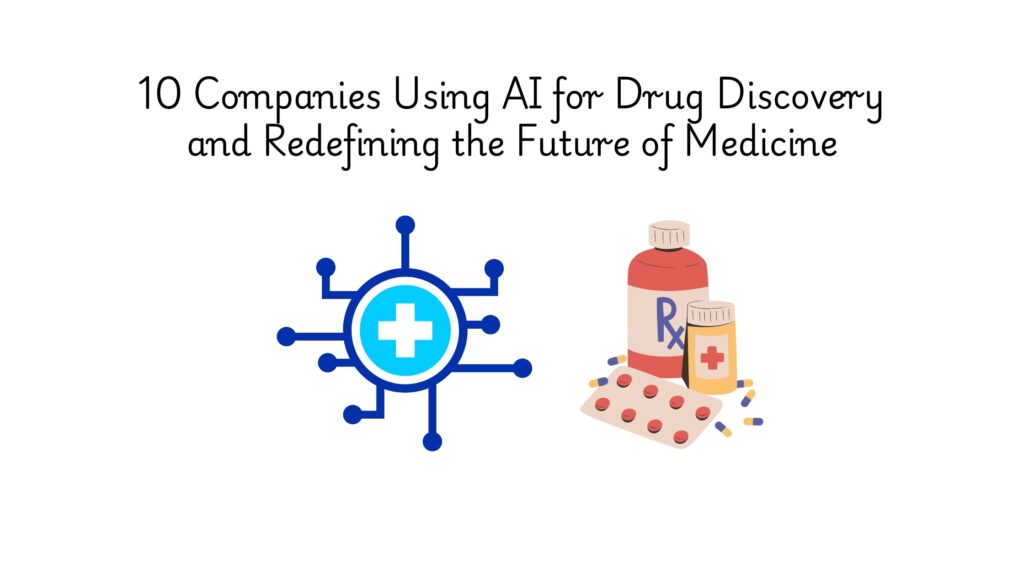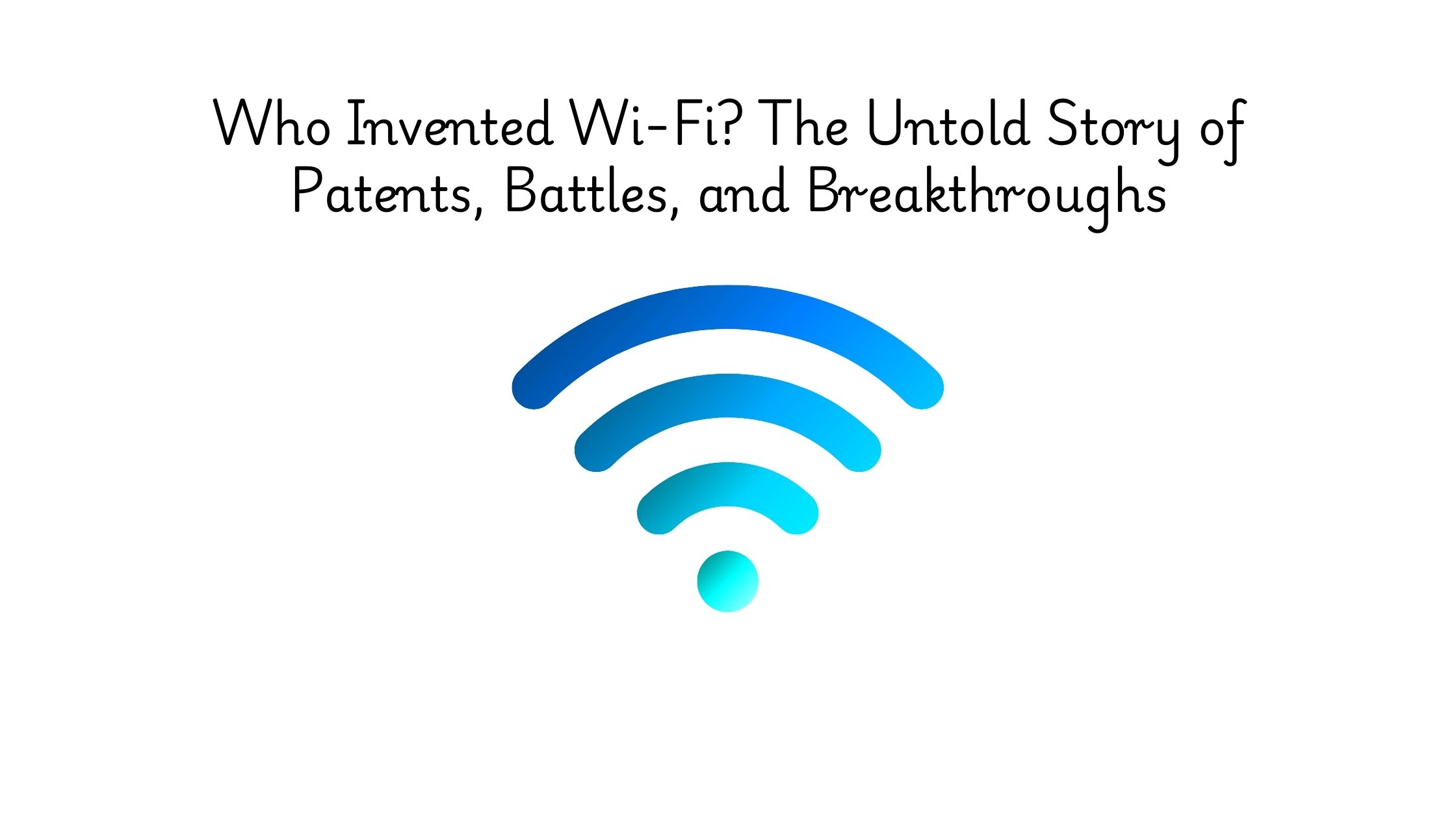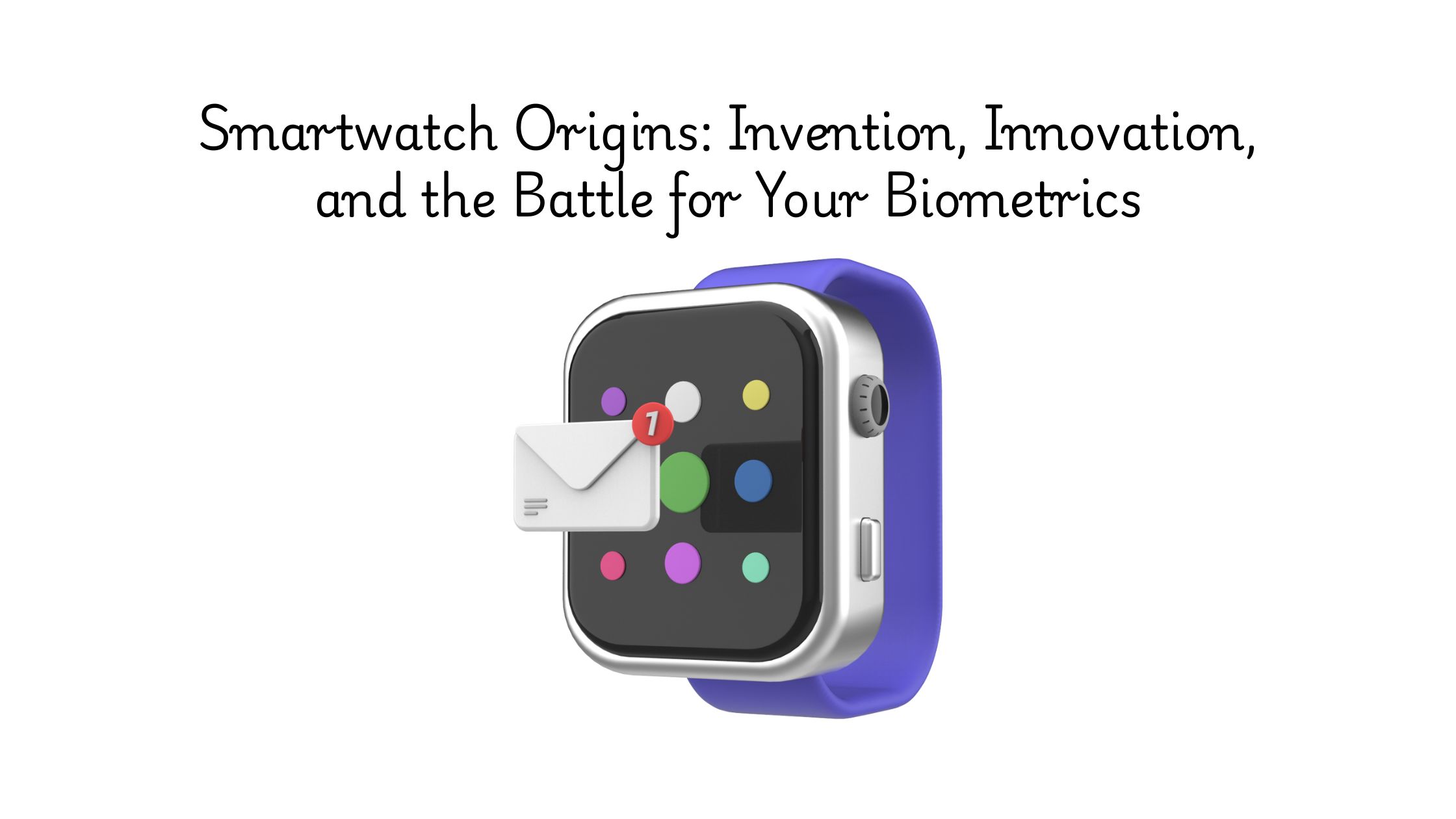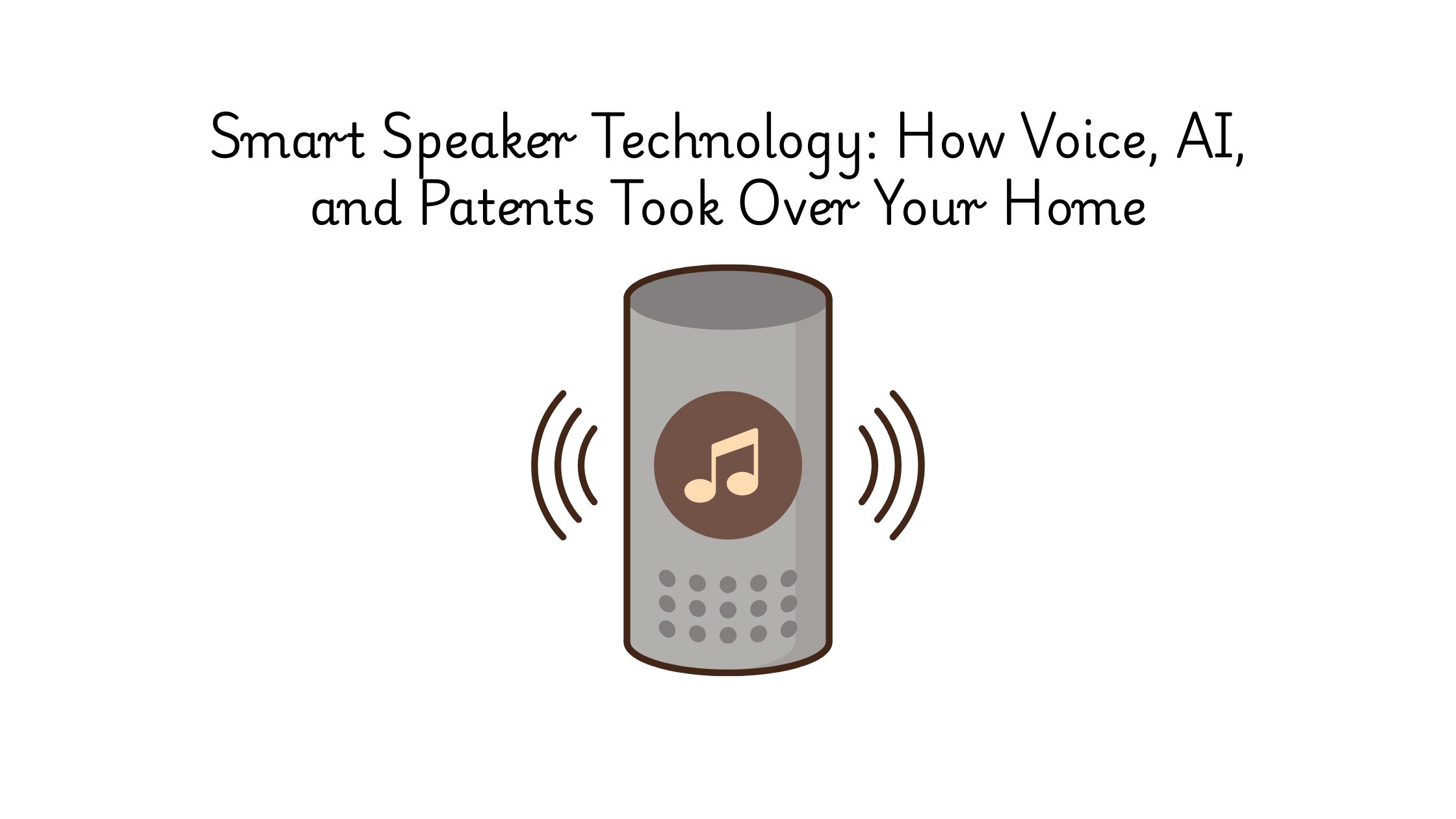AI is reshaping how we discover medicine: faster, cheaper, and smarter.
Once driven by trial and error, drug discovery is now guided by machine learning models that predict targets, generate molecules, and optimize clinical trials. According to Precedence Research, the global AI drug discovery market is expected to grow from $6.93 billion in 2025 to over $16.52 billion by 2034.
However, not every company using AI buzzwords is breaking new ground. The real leaders are solving complex challenges, like protein modeling, compound screening, and pipeline acceleration, with defensible IP and real clinical progress.
In this article, we profile 10 companies using AI for drug discovery that are truly moving the science and the industry forward.
#1. Insilico Medicine

Source: Insilico Medicine
Founded in 2014 by Alex Zhavoronkov, Insilico Medicine has emerged as a leader in integrating artificial intelligence (AI) with drug discovery and development. The company is renowned for its end-to-end AI-driven platform, Pharma.AI, which encompasses target identification, molecule generation, and clinical trial prediction.
Notably, Insilico achieved a groundbreaking milestone by advancing the first AI-discovered and AI-designed drug, INS018_055, into Phase II clinical trials for idiopathic pulmonary fibrosis (IPF) in 2024.
Industry Impact
Insilico Medicine is transforming the pharmaceutical industry by significantly reducing the time and cost associated with drug discovery. Through its AI-powered platforms, the company accelerates the identification of novel therapeutic targets and designing drug candidates. Thus enhancing the efficiency of bringing new drugs to market.
Among the companies using AI for drug discovery, Insilico is a pivotal player in the biotech sector, fostering collaborations with major pharmaceutical companies and research institutions.
Key Innovations
- Pharma.AI Platform
Pharma.AI is an integrated AI-driven drug discovery platform that combines multiple technologies to streamline the drug development process. It includes PandaOmics for target discovery, Chemistry42 for molecular design, and InClinico for clinical trial outcome prediction. - PandaOmics
PandaOmics is an AI-powered platform designed to discover novel therapeutic targets. It enables researchers to analyze vast amounts of biomedical data to identify and prioritize potential drug targets effectively. - Chemistry42
Chemistry42 is an AI-driven platform for molecular design and optimization. It utilizes deep generative models to create novel molecular structures with desired properties, facilitating the rapid development of promising drug candidates. - INS018_055
INS018_055 is a novel, first-in-class drug candidate designed using generative AI to treat idiopathic pulmonary fibrosis (IPF). It has demonstrated positive results in Phase IIa clinical trials, showcasing the potential of AI-driven drug discovery.
Patent Activity
As of 2024, Insilico Medicine holds several patents on its AI-driven drug discovery technologies. These patents underscore the company’s commitment to innovation in the biotech industry.
Notable Patents
US11680063B2: Entangled Conditional Adversarial Autoencoder for Drug Discovery
This patent describes a method for generating new molecular structures with desired properties using an entangled conditional adversarial autoencoder, facilitating the discovery of promising drug candidates.
US11530197B2: Analogs for the Treatment of Disease
This patent pertains to novel analog compounds developed for therapeutic applications, highlighting Insilico’s commitment to advancing drug discovery through AI.
US10689360B1: TLR Inhibitors
This patent details specific inhibitors targeting Toll-like receptors (TLRs), contributing to developing treatments for inflammatory and autoimmune diseases.
#2. Recursion Pharmaceuticals

Source: Recursion Pharmaceuticals
Founded in 2013 and headquartered in Salt Lake City, Utah, Recursion Pharmaceuticals is a biotechnology company that integrates artificial intelligence (AI) and machine learning into drug discovery and development. The company’s platform combines automated, high-content microscopy with advanced computational techniques to rapidly identify potential therapeutics across various disease areas. As of 2025, Recursion has developed a diverse pipeline targeting conditions in oncology, rare diseases, and infectious diseases.
In July 2023, Recursion acquired Exscientia’s platform and pipeline assets, strengthening its presence among companies using AI for drug discovery and expanding its capabilities in molecular design and precision targeting.
Industry Impact
Recursion Pharmaceuticals is recognized as one of the companies using AI for drug discovery that reshaped the industry by combining large-scale phenotypic screening with advanced machine learning. In 2023, it strengthened this position by acquiring Exscientia’s platform and pipeline assets, merging two of the field’s most advanced AI ecosystems. The deal expands Recursion’s capabilities in generative chemistry and solidifies its standing as a vertically integrated leader in computational drug development.
Key Innovations
- Recursion OS
An end-to-end AI-driven platform that integrates automated experimentation with computational analysis to accelerate drug discovery. Recursion OS enables the rapid generation and interpretation of biological data, facilitating the identification of potential therapeutics. - High-Throughput Screening
Utilizing automated systems, Recursion conducts large-scale phenotypic screenings to assess the effects of thousands of compounds across diverse cellular models. This approach allows for the efficient identification of potential drug candidates and their mechanisms of action. - Digital Maps of Biology
The company employs machine learning algorithms to create comprehensive digital maps representing complex biological relationships. These maps aid in understanding disease mechanisms and identifying potential therapeutic targets.
Patent Activity
As of 2025, Recursion Pharmaceuticals has been actively securing patents related to its AI-driven drug discovery technologies, reflecting its commitment to innovation in the pharmaceutical industry.
Notable Patents
WO2024039689A1: Heterocyclic RBM39 Modulators
This patent describes compounds that modulate RNA-binding motif protein 39 (RBM39), which may be useful in treating disorders associated with RBM39, such as certain cancers.
AU2022228430A1: Diazepine Derivatives for Disease Treatment
This patent details diazepine derivatives and their use in treating diseases, highlighting Recursion’s efforts in developing novel therapeutic compounds.
US11393560B2: Systems and Methods for High Throughput Compound Library Creation
This patent outlines techniques for efficiently creating compound libraries for high-throughput screening, streamlining the drug discovery process.
#3. BenevolentAI

Source: BenevolentAI
Founded in 2013 and headquartered in London, UK, BenevolentAI is a clinical-stage artificial intelligence (AI) company that integrates advanced AI and machine learning techniques into drug discovery and development. The company aims to unite AI and cutting-edge science to discover and develop new medicines for complex diseases.
Industry Impact
BenevolentAI has significantly influenced the pharmaceutical industry by demonstrating the potential of AI to accelerate drug discovery processes. The company’s platform has led to the identification of novel drug candidates. It has fostered collaborations with major pharmaceutical companies, such as AstraZeneca and Merck, to leverage AI in identifying new therapeutic targets.
Key Innovations
- The Benevolent Platform™
A versatile, scalable, and robust AI-enabled drug discovery platform that integrates biomedical data to uncover complex disease mechanisms, identify novel targets, and develop effective therapeutics. - Graph Neural Networks with Attention
BenevolentAI has developed methods for generating graph neural network models that incorporate attention mechanisms, allowing for more accurate modeling of complex biological interactions and facilitating the discovery of potential drug candidates.
Patent Activity
As of 2025, BenevolentAI has been actively securing patents related to its AI-driven drug discovery technologies, reflecting its commitment to innovation in the pharmaceutical industry.
Notable Patents
US12106217B2: Graph Neural Networks with Attention
This patent describes methods and apparatus for generating a graph neural network model based on an entity- entity graph. It incorporates attention weights to indicate the relevancy of relationships between entities, thereby enhancing the modeling of complex biological systems.
US11886822B2: Hierarchical Relationship Extraction
This patent details methods and systems for embedding portions of text that describe entities and their relationships, improving the extraction and representation of complex hierarchical relationships in biomedical data.
US12094578B2: Shortlist Selection Model for Active Learning
This patent outlines a method for generating a selection model based on machine learning techniques to select a shortlist of compounds requiring validation for specific properties, thereby optimizing the drug discovery process.
#4. Atomwise
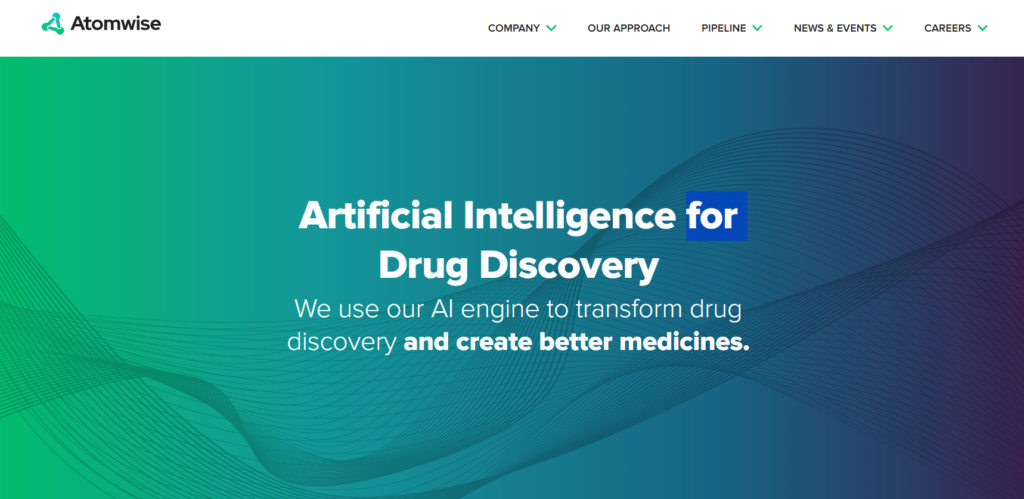
Source: Atomwise
Founded in 2012 and headquartered in San Francisco, California, Atomwise is a technology-enabled pharmaceutical company that leverages artificial intelligence (AI) to revolutionize small molecule drug discovery.
As of 2025, Atomwise has collaborated with over 750 academic institutions and pharmaceutical companies, addressing more than 600 disease targets.
Industry Impact
Atomwise has significantly influenced the pharmaceutical industry by demonstrating that companies using AI for drug discovery can effectively replace traditional high-throughput screening methods. The company’s AI-driven approach has accelerated the drug discovery process, leading to partnerships with major pharmaceutical firms such as Eli Lilly, Bayer, and Sanofi. These collaborations aim to tackle challenging disease targets and develop novel therapeutics.
Key Innovations
- AtomNet® Platform
AtomNet® is a deep convolutional neural network designed for structure-based drug discovery. It predicts the bioactivity of small molecules by analyzing millions of data points and thousands of protein structures, facilitating the identification of promising drug candidates. - AI-Driven High-Throughput Screening Alternative
Atomwise has demonstrated that its AI platform can be a viable alternative to traditional high-throughput screening. In a study involving 318 targets, the AtomNet® model identified structurally novel hits for 235 targets, achieving a success rate of 74%, which surpasses traditional methods. - Strategic Collaborations
The company has established partnerships with pharmaceutical giants like Sanofi and Eli Lilly to leverage its AI platform for the discovery and development of novel therapeutics. These collaborations focus on various targets, including those considered “undruggable.”
Patent Activity
As of 2025, Atomwise has been actively securing patents related to its AI-driven drug discovery technologies, reflecting its commitment to innovation in the pharmaceutical industry.
Notable Patents
US9373059B1: Systems and Methods for Applying a Convolutional Network to Spatial Data
This patent describes the application of convolutional neural networks to spatial data, a foundational aspect of Atomwise’s AtomNet® technology.
US10546237B2: Systems and Methods for Correcting Error in a First Classifier by Evaluating Classifier Output in Parallel
This patent describes systems and methods for classifying a test object by posing it against multiple target objects, scoring the interactions with a first classifier, and then inputting these scores into a second classifier to obtain an indication of a target object. This approach aims to correct errors in the first classifier by evaluating its output in parallel, enhancing the accuracy of object classification.
#5. Deep Genomics
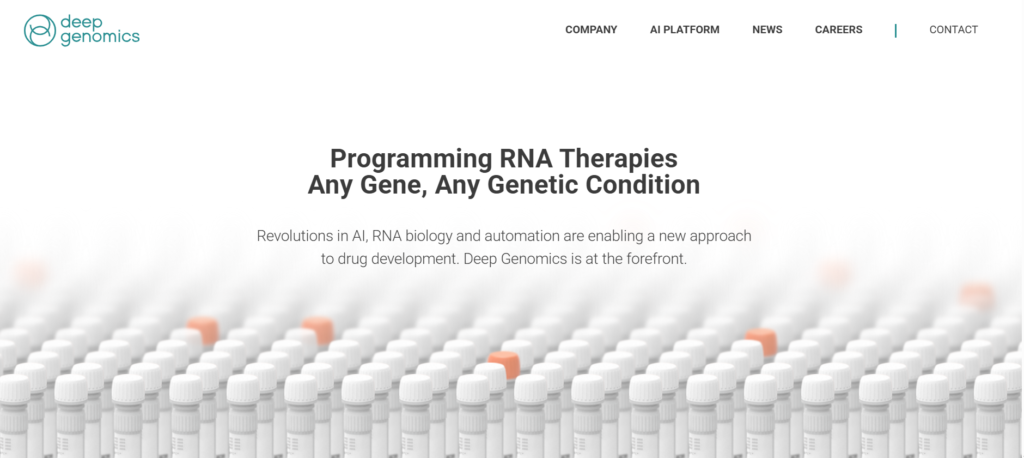
Source: Deep Genomics
Founded in 2014 and headquartered in Toronto, Canada, Deep Genomics is a biotechnology company that leverages artificial intelligence (AI) to pioneer the discovery and development of genetic medicines. The company’s proprietary AI platform integrates advanced machine learning techniques with vast datasets to decode RNA biology, facilitating the identification of novel therapeutic targets and the design of RNA-based drug candidates.
As of 2025, Deep Genomics has expanded its operations to Cambridge, Massachusetts, and has developed a pipeline addressing various genetically defined diseases. It includes metabolic and neurological disorders.
Industry Impact
Deep Genomics has significantly influenced the pharmaceutical industry by demonstrating the potential of AI in accelerating the discovery of RNA-based therapies. The company’s AI Workbench analyzes genomic data to identify therapeutic targets and design RNA-based drug candidates for genetically defined diseases. This innovative approach has positioned Deep Genomics as a leader in integrating AI and RNA biology for drug development. This makes it one of the fast-emerging companies using AI in drug discovery to watch out for.
Key Innovations
- AI Workbench
Deep Genomics has developed the AI Workbench, a platform that analyzes genomic data to identify therapeutic targets and design RNA-based drug candidates for genetically defined diseases. - Proprietary AI Platforms
The company’s proprietary AI platforms consist of datasets, data processing pipelines, and machine learning systems. It includes foundation models, large language models, and software engineering systems. These platforms enable the integration of AI with RNA biology to uncover complex disease mechanisms and develop effective therapeutics. - Expansion into Cambridge, Massachusetts
In 2024, Deep Genomics expanded its operations to Cambridge, Massachusetts, reflecting its growth and commitment to advancing AI-driven drug discovery.
Patent Activity
As of 2025, Deep Genomics holds a total of 68 patents globally, with 18 granted and 66% of them active. The United States accounts for most of these filings, underscoring the company’s commitment to protecting its innovations in AI-driven genetic medicine. I
Notable Patents
US10185803B2: Systems and Methods for Classifying, Prioritizing, and Interpreting Genetic Variants and Therapies Using a Deep Neural Network
This patent describes systems and methods that utilize deep neural networks to classify, prioritize, and interpret genetic variants and therapies, enhancing the accuracy and efficiency of genetic analysis.
US10410118B2: System and Method for Training Neural Networks
This patent details a system and method for training neural networks, contributing to the development of more effective AI models for genetic data analysis.
US11183271B2: Neural Network Architectures for Linking Biological Sequence Variants Based on Molecular Phenotype
This patent presents neural network architectures designed to link biological sequence variants with molecular phenotypes, facilitating the interpretation of genetic variations and their impact on disease.
#6. insitro
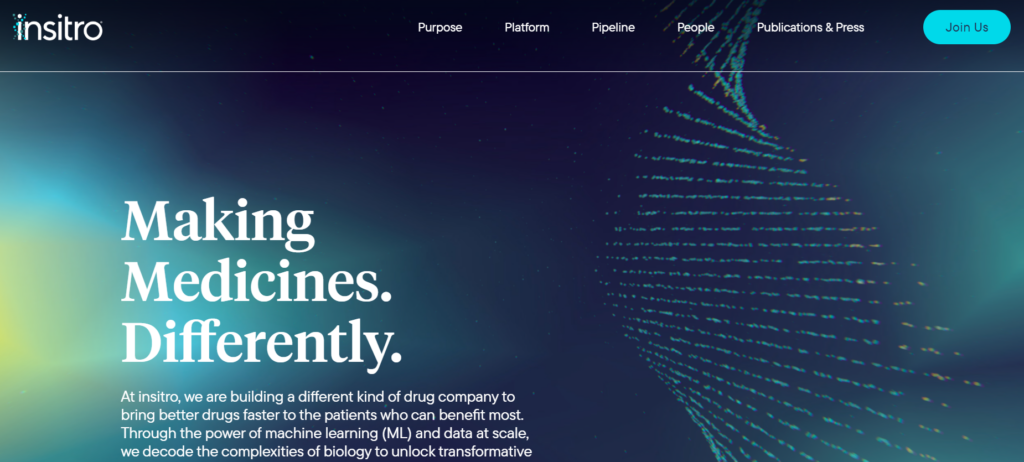
Source: insitro
Founded in 2018 and headquartered in South San Francisco, California, insitro is a machine learning-enabled drug discovery and development company. The company integrates high-throughput biology with advanced machine learning techniques to create predictive models for disease and therapeutic interventions.
As of 2025, insitro has collaborated with major pharmaceutical companies, including Bristol Myers Squibb and Eli Lilly, to advance novel treatments for complex diseases.
Industry Impact
insitro has significantly influenced the pharmaceutical industry by demonstrating the potential of machine learning to transform drug discovery processes. The company’s platform enables the generation of large-scale, high-quality datasets. When combined with AI models, they facilitate the identification of novel therapeutic targets and the development of effective treatments. This approach has led to partnerships with pharmaceutical giants aiming to address diseases with high unmet medical needs.
Key Innovations
- Machine Learning-Powered Drug Discovery Platform
insitro has developed a platform that combines high-throughput biological data generation with advanced machine learning models to predict disease progression and therapeutic responses, enhancing the efficiency of drug discovery. - Strategic Collaborations
The company has entered into multiple strategic agreements with pharmaceutical companies, such as a collaboration with Bristol Myers Squibb, resulting in a $25 million milestone payment for identifying a novel genetic target for amyotrophic lateral sclerosis (ALS). - Advancements in Metabolic Disease Treatments
In partnership with Eli Lilly, insitro is working to advance novel treatments for metabolic diseases, including metabolic dysfunction-associated steatotic liver disease (MASLD), utilizing targets identified through its machine learning platform.
Patent Activity
As of 2025, insitro holds a total of 29 patents globally, with three granted and over 86% active. The United States accounts for most of these filings, reflecting the company’s commitment to protecting its innovations in AI-driven drug discovery.
Notable Patents
US12198344B2: Autonomous Cell Imaging and Modeling System
This patent describes an autonomous platform that utilizes machine learning techniques for continuously studying live biological cells through microscopy imaging data, applicable in evaluating various cellular processes.
US20240294863A1: Autonomous Maintenance and Differentiation of Induced Pluripotency Cells
This patent application details an autonomous system employing machine learning for maintaining and differentiating induced pluripotent stem cells based on quality and confluence conditions to obtain differentiated cells for phenotypic analyses.
#7. Schrödinger, Inc.
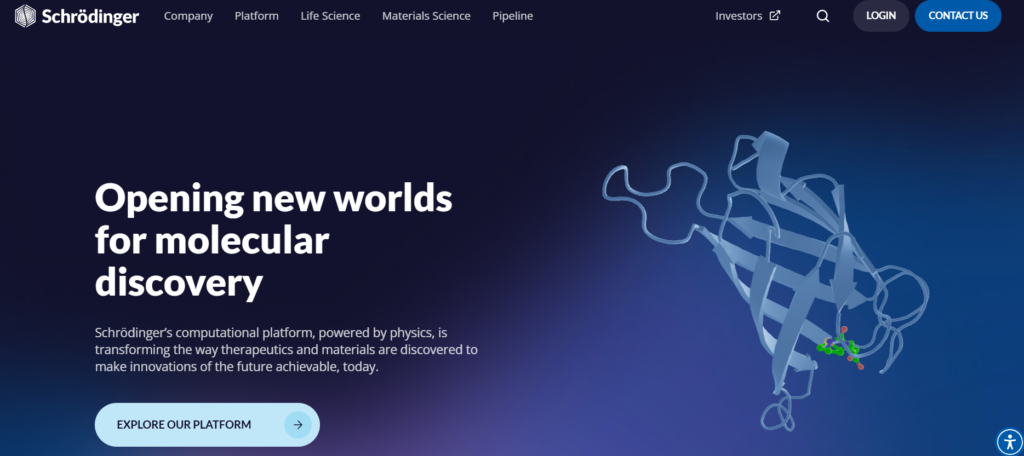
Source: Schrödinger, Inc.
Founded in 1990 and headquartered in New York City, Schrödinger, Inc. is a life sciences and materials science company specializing in computational chemistry and molecular simulations. The company has developed a physics-based computational platform integrating machine learning and artificial intelligence to accelerate drug discovery and materials design.
Pharmaceutical and biotechnology companies, academic institutions, and government laboratories worldwide utilize Schrödinger’s platform, making it one of the competitive companies using AI for drug discovery.
Industry Impact
Schrödinger has significantly impacted the pharmaceutical industry by providing advanced computational tools that enhance the efficiency and accuracy of drug discovery processes. The company’s platform allows researchers to predict molecular properties and behaviors, reducing the reliance on traditional trial-and-error methods.
This approach has led to collaborations with major pharmaceutical companies, including a multi-year agreement with Novartis in 2024, potentially worth up to $2.5 billion, to advance drug discovery programs.
Key Innovations
- Physics-Based Computational Platform
Schrödinger’s platform combines physics-based modeling with machine learning algorithms to predict the structure and behavior of molecules accurately. This integration enables the rapid identification and optimization of potential drug candidates. - LiveDesign
LiveDesign is an enterprise informatics platform developed by Schrödinger that facilitates real-time collaboration among interdisciplinary research teams. It allows for the sharing and analysis of data, streamlining the drug discovery process. - Collaborative Drug Discovery System
Schrödinger has developed systems that enable collaborative drug discovery through electronic workplaces accessible by multiple users. These platforms support simultaneous data analysis and compound evaluation, enhancing collaborative research efforts.
Patent Activity
As of 2025, Schrödinger holds several patents related to its computational drug discovery technologies, reflecting its commitment to innovation in the pharmaceutical industry.
Notable Patents
US9965597B2: Collaborative Drug Discovery System
This patent describes methods and systems for collaborative drug discovery, providing electronic workplaces that are simultaneously accessible by multiple users. It facilitates the sharing and updating of data related to compounds and their properties.
US10726946B2: Methods and Systems for Calculating Free Energy Differences Using an Alchemical Restraint Potential
This patent describes a method for computing the free energy difference between a reference molecule and a target molecule. The process involves applying a potential to restrain interactions of additional atomic components, determining transition states along a transformation path, and scaling the restraint potential correspondingly.
#8. Relay Therapeutics
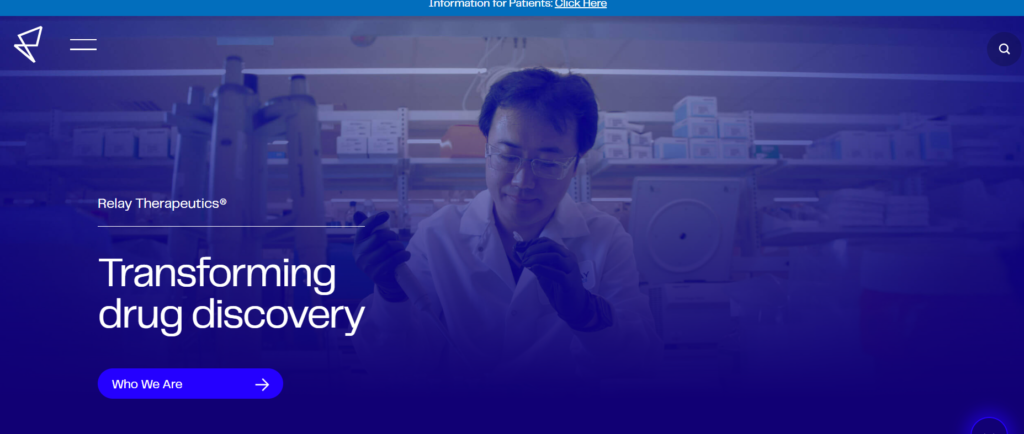
Source: Relay Therapeutics
Founded in 2015 and headquartered in Cambridge, Massachusetts, Relay Therapeutics is a clinical-stage precision medicine company that integrates computational and experimental technologies to transform drug discovery. As of 2025, Relay Therapeutics has advanced multiple drug candidates into clinical trials, focusing on precision oncology and genetic diseases. It is one of the fast-emerging companies using AI in drug discovery.
Industry Impact
Relay Therapeutics has significantly influenced the pharmaceutical industry by pioneering the integration of protein dynamics into drug discovery. This approach has enabled the targeting of proteins previously considered undruggable, thereby expanding the therapeutic possibilities for various diseases. The company’s focus on precision medicine aims to develop therapies tailored to specific genetic profiles, enhancing treatment efficacy and patient outcomes.
Key Innovations
- Dynamo™ Platform
Relay Therapeutics’ proprietary Dynamo™ platform leverages computational modeling and machine learning to analyze protein motion, facilitating the design of small molecule inhibitors that can effectively target dynamic protein structures. - Clinical-Stage Drug Candidates
The company has progressed multiple drug candidates into clinical development, including inhibitors targeting SHP2 and FGFR2, which are implicated in various cancers. These candidates aim to provide targeted therapies with improved specificity and efficacy. - Strategic Collaborations
Relay Therapeutics has partnered with leading research organizations and pharmaceutical companies to enhance its drug discovery efforts and expand its therapeutic pipeline.
Patent Activity
As of 2025, Relay Therapeutics has been actively securing patents related to its drug discovery technologies and therapeutic compounds, reflecting its commitment to innovation in precision medicine.
Notable Patents
US11629145B2: SHP2 Phosphatase Inhibitors and Methods of Use Thereof
This patent describes novel compounds that inhibit SHP2 phosphatase, a target implicated in various cancers. The compounds have potential therapeutic applications in treating disorders associated with SHP2 deregulation.
US11780845B2: FGFR Inhibitors and Methods of Use Thereof
This patent covers novel inhibitors of fibroblast growth factor receptors (FGFR), which play a role in tumor growth and survival. The compounds may be used to treat cancers driven by FGFR alterations.
#9. Isomorphic Labs

Source: Isomorphic Labs
Founded in 2021 and headquartered in London, United Kingdom, Isomorphic Labs is an AI-driven drug discovery company and a subsidiary of Alphabet Inc. The company leverages advanced artificial intelligence technologies to model and understand biological systems, aiming to accelerate the development of novel therapeutics. In December 2022, Isomorphic Labs expanded its operations by opening a second office in Lausanne, Switzerland.
Industry Impact
Isomorphic Labs has made significant strides in the pharmaceutical industry by integrating AI to revolutionize drug discovery processes. The company’s collaboration with pharmaceutical giants Novartis and Eli Lilly, announced in January 2024, underscores its role in advancing AI-driven research and development.
Key Innovations
- AlphaFold 3
In May 2024, Isomorphic Labs, in collaboration with Google DeepMind, released AlphaFold 3, an AI platform capable of predicting protein folding and interactions with drug-like molecules such as ligands and antibodies. This advancement is expected to accelerate drug discovery by providing deeper insights into molecular interactions. - Strategic Partnerships
Isomorphic Labs has established strategic collaborations with Novartis and Eli Lilly to leverage AI in drug discovery, focusing on developing small-molecule therapeutics for various diseases. - Expansion into Switzerland
The opening of a second office in Lausanne, Switzerland, in December 2022, reflects the company’s commitment to expanding its research capabilities and fostering international collaborations in the biotech sector.
Patent Activity
As of April 2025, Isomorphic Labs has not publicly disclosed specific patents. However, the company’s innovative use of AI in drug discovery and its collaborations suggest active engagement in developing proprietary technologies in this domain.
#10. Lantern Pharma
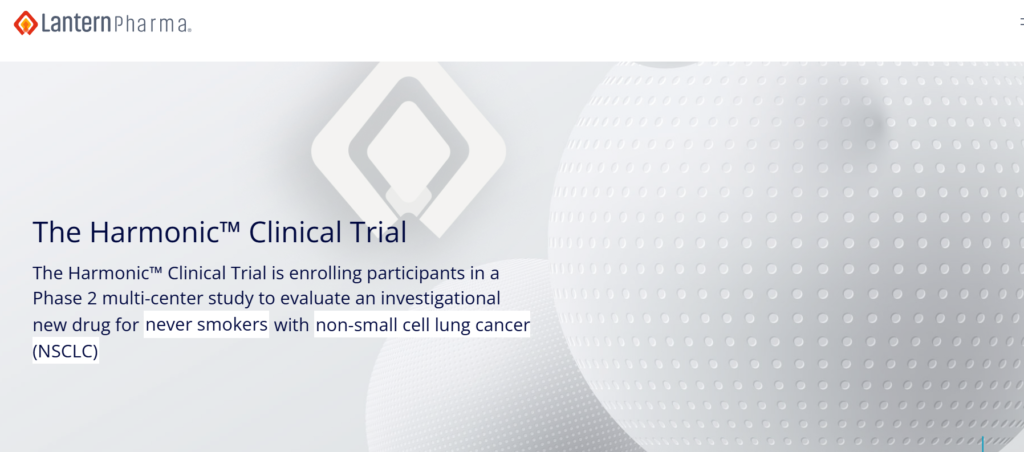
Source: Lantern Pharma
Founded in 2013 and headquartered in Dallas, Texas, Lantern Pharma is a clinical-stage biotechnology company leveraging artificial intelligence (AI) and machine learning to transform the oncology drug discovery and development process. As of 2025, Lantern Pharma has advanced multiple drug candidates into clinical trials, focusing on various cancer indications.
Industry Impact
Lantern Pharma has significantly influenced the pharmaceutical industry by demonstrating the potential of AI to de-risk and expedite oncology drug development. By integrating computational biology with machine learning, the company has streamlined the identification of promising drug candidates and relevant patient populations. This approach has led to collaborations with academic institutions and research organizations, positioning Lantern Pharma as a leader in AI-driven precision oncology.
Key Innovations
- RADR® Platform
Lantern Pharma’s proprietary AI platform, RADR®, is designed to rapidly analyze complex oncology datasets to identify potential drug candidates and corresponding biomarkers. This platform facilitates the development of targeted therapies by predicting patient responses and optimizing clinical trial designs. - LP-184
LP-184 is a small-molecule drug candidate developed using insights from the RADR® platform. It is currently in preclinical development for treating genomically defined subsets of cancers, including pancreatic and prostate cancers. - LP-300
LP-300 is a late-stage drug candidate targeting non-small cell lung cancer (NSCLC) in non-smoking patients. Lantern Pharma is utilizing its AI-driven approach to identify biomarkers that may predict patient responses to LP-300, aiming to enhance the precision and efficacy of the treatment.
Patent Activity
As of 2025, Lantern Pharma actively manages a patent portfolio with over 100 issued patents and pending applications across 14 patent families. These patents reflect the company’s commitment to innovation in AI-driven drug discovery and its focus on developing targeted oncology therapeutics.
Notable Patents
US11739043B2: Illudin Analogs, Uses Thereof, and Methods for Synthesizing the Same
This patent covers novel illudin derivatives, their intermediates, preparation methods, pharmaceutical compositions, and therapeutic uses. These derivatives are designed to interact with DNA, effectively blocking transcription processes, which can be beneficial in treating cancers and inflammatory diseases.
US20240398732A1: Treating Cancers with Combinations of Spironolactone and Acylfulvenes
This application details methods for treating cancer using a combination of acylfulvene compounds and spironolactone. The synergistic effect of this combination aims to enhance therapeutic outcomes in cancer treatment.
The AI Drug Discovery Race Isn’t Just About Speed; It’s About Strategy.
The companies using AI in drug discovery in this article aren’t just experimenting with AI; they’re building proprietary platforms, advancing molecules into clinical trials, and protecting breakthroughs that could define the next generation of medicine.
From deep learning models that predict RNA splicing to digital maps of cell behavior, these innovators are translating data into therapeutics, and they’re backing it up with strong IP.
So how do you separate AI-flavored marketing from real, defensible innovation?
Patent intelligence gives you the truth.
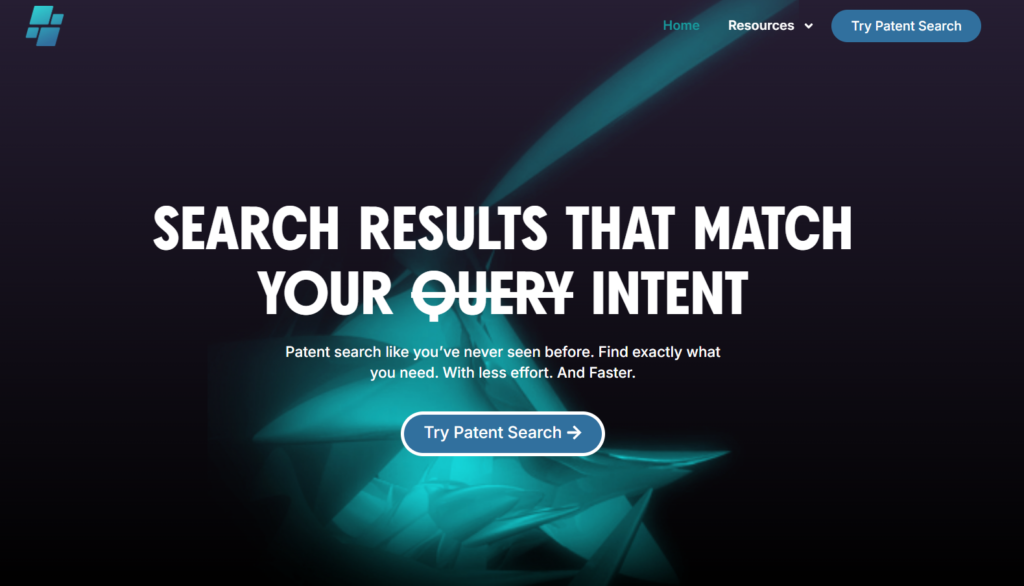
That’s where Global Patent Search becomes your competitive edge.
Whether you’re one of the emerging companies using AI in drug discovery, building an AI-first biotech, investing in the future of medicine, or scouting IP for strategic advantage, our platform helps you:
- Search AI drug discovery patents by concept, function, or technology layer.
- Map claim coverage from algorithms to biologics.
- Track innovation clusters by company, therapeutic area, or filing timeline.
Want to know who’s really shaping the future of AI in pharma? Start by seeing who’s protecting it.
Explore the drug discovery IP landscape with Global Patent Search.

